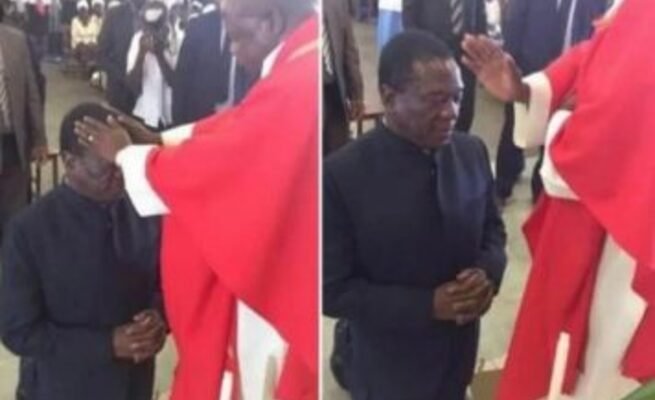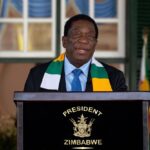In a historic move, Zimbabwe’s Senate has approved a bill to abolish the death penalty, a significant step towards reforming the country’s criminal justice system. The bill, passed late Wednesday night, is now awaiting the signature of President Emmerson Mnangagwa to officially become law. This decision comes nearly two decades after the last execution in Zimbabwe, which occurred in 2005.
The death penalty has been a contentious issue in Zimbabwe, with the method of execution primarily being hanging. Over the years, a lack of willingness to serve as the state executioner has contributed to the decline of this practice. President Mnangagwa, who has held office since 2017, has publicly opposed capital punishment, citing his own harrowing experiences with death sentences during his life.
Mnangagwa faced execution in two distinct instances. In the first incident, in 1962, when he was sentenced to death by a tribunal led by Dumiso Dabengwa. During the latter incident, he was accused of having insulted ZAPU leader Joshua Nkomo, leading to the tribunal’s decision to impose the death penalty. This accusation stemmed from an incident at Freedom House in Lusaka, where Mnangagwa, then the secretary for youth, was falsely accused of disrespecting Nkomo during a meeting. This is probably the reason why there was always bad blood between Mnangagwa and Dabengwa for decades.
In 2015, while serving as Vice President, Mnangagwa recounted this dramatic episode to a gathering of ZANU-PF supporters in Mvuma. He claimed that a cabal of ZAPU officials, led by Dabengwa, had decided to kill him following the alleged insult. Mnangagwa narrated how Leopold Takawira, a prominent nationalist from his home area of Zvishavane, intervened to save his life. He explained that after being isolated in a separate room by the ZAPU officials, Takawira sent a message that Mnangagwa was to be included in a delegation to Ghana, thereby averting the planned murder.
Mnangagwa said the incident happened at Freedom House in Lusaka when Dabengwa falsely accused him of having insulted the ZAPU leader, Nkomo, who had visited the party regional office on his way to Britain and United States of America after it had been banned in Rhodesia.
At the time he was secretary for youth. While relating the incident in Ndebele, mimicking the Zapu officials, Mnangagwa said:
“UDumiso wasukuma wabe esithi, Mdhala (Nkomo) kulomfana konapha ukhade elithethisa. Kwatwa ungaphi? Kwatwa ukhonapha. Kwatwa sukuma. Ngasikhuma. UNkomo wabe esithi khonoku ukunje… wabe ehleka wahamba. (Dumiso rose up in a meeting and said to Nkomo, old man, there is a boy who was insulting you.
They told me to stand up – Nkomo laughed and said how can a small boy like this do that, before walking away).” When Nkomo left the Zapu officials, who included a Mlala and Nkiwane, held a Kangaroo court and decided that Mnangagwa should be killed for the “offence.”
“The officials who had passed the verdict, with Dumiso having been their judge, then said so how do we kill him. One of them answered and said we cannot discuss that in the presence of the boy.
So I was put in a separate room. However, the guy who was made to guard the room asked me where I came from in Zimbabwe and I told him that I was from Shabani, now Zvishavane.
He then said his mother also came from the area and felt sorry for me. He then went straight to the hotel of Takawira to tell him of my predicament.
“In order to fool the Zapu officials, Takawira, who held a high position in Zapu, sent back the boy to where I was with the message that I was supposed to be one of six people to be sent to Ghana for some mission. That is how I survived,” said Mnangagwa.
President Mnangagwa’s personal experience with capital punishment has profoundly shaped his stance. In the second incident, during the country’s war of independence in the 1960s, he was again sentenced to death by the Ian Smith regime for his involvement in blowing up a train. This sentence was later commuted to ten years’ imprisonment.
Different accounts exist regarding the circumstances surrounding this sentence, including claims that Robert Mugabe played a big role in helping source a lawyer to represent Mnangagwa in appealing against the death sentence.
However, his authorised biography, “Life of Sacrifice: Emmerson Mnangagwa,” written by his advisor Eddie Cross, presents a different version of events. According to a court record cited in the book, the judge in Mnangagwa’s 1965 trial for bombing a train near Fort Victoria (now Masvingo) explicitly stated that he would not be sentencing him to death because he was underage. Justice John Lewis declared, “I do not therefore propose to sentence you to death.” Mnangagwa was subsequently sentenced to 10 years’ imprisonment.
Meanwhile, Justice Minister Ziyambi Ziyambi addressed the Senate before the bill’s passage, acknowledging the emotional weight of the topic. He stated, “I stand before this House to seek the abolition of the death penalty. The deliberation will be emotional… Our culture does not allow us to kill someone because they have murdered someone.”
He emphasised that traditional Zimbabwean beliefs do not support capital punishment, calling for a reconsideration of its place in modern society.
Senator Tongogara heralded the bill as “a landmark piece of legislation that seeks to fundamentally transform Zimbabwe’s criminal justice system.”
She highlighted the trend towards abolition globally, noting that 112 countries have already abolished the death penalty for all crimes, while 142 are abolitionist in law or practice. “By joining this growing majority, Zimbabwe strengthens its position as a progressive nation committed to human rights and justice,” she affirmed.
Despite the overwhelming support for the abolition, dissenting voices were heard in the Senate. Senator Linda Sibanda expressed her anguish over the bill, sharing the recent murder of her cousin, Hilary Muleya, and questioning whether it was just to spare those who commit such acts.
“It is so painful to just spare a murderer who does not even show any remorse,” she lamented, illustrating the complexities of the debate and the deep emotional scars left by violent crime in society.
The historical context of President Mnangagwa’s relationship with the death penalty is particularly poignant. In addition to his near-execution by the Dabengwa tribunal, he was sentenced to death under the Ian Smith regime after a bombing incident. However, this sentence was also commuted, and he served a 10-year prison term instead. This experience has shaped his views on capital punishment and led him to advocate for its abolition.
Currently, Zimbabwe has more than 60 inmates on death row, a reflection of the ongoing impact of capital punishment in the legal system. Amnesty International has urged the President to sign the bill into law promptly and commute the sentences of those awaiting execution, aligning Zimbabwe with a global movement towards the abolition of capital punishment. Approximately three-quarters of the world’s nations have moved away from this practice, with Zimbabwe being one of the few in Africa that still enforces it without a moratorium.
Amnesty’s recent report highlighted that there were 1,153 known executions worldwide in 2023, an increase from the previous year. Nevertheless, the true number of executions is likely higher, as many countries, such as China, keep their data confidential. In Africa, countries like Mozambique, Namibia, and South Africa have abolished the death penalty, while Rwanda eliminated it following the 1994 genocide.
In conclusion, the abolition of the death penalty in Zimbabwe could mark a new chapter in the country’s legal and moral landscape, reflecting a commitment to uphold human dignity and promote a more just society. The emotional, historical, and cultural dimensions of this issue resonate deeply within the nation, and the outcome of this legislative process will be closely watched both domestically and internationally.














